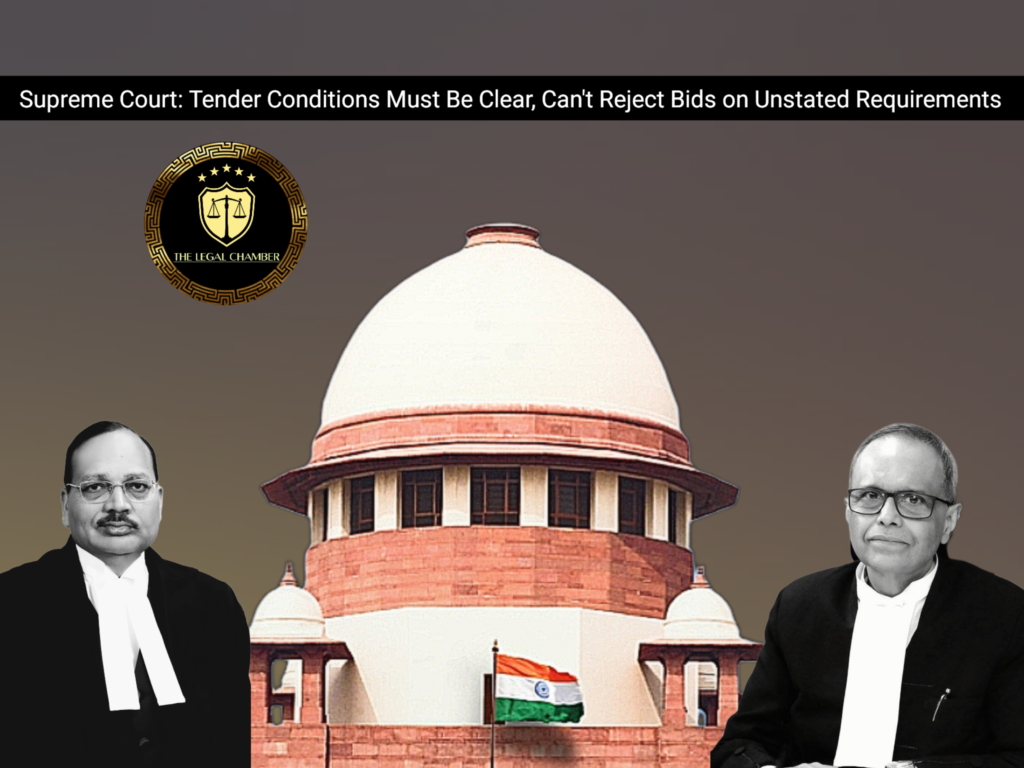
The Supreme Court ruled that tender conditions must be explicit and unambiguous. A bidder cannot be disqualified for non-submission of a document not expressly mandated by the tender. The tendering authority must act fairly and cannot impose hidden requirements, especially when a submitted certificate adequately demonstrates compliance with the stated criteria.
Facts Of The Case:
The case involved a tender issued by Madhya Pradesh Power Generating Co. Ltd. (MPPGCL) for coal beneficiation work. Maha Mineral, the appellant, submitted its bid relying on its past experience as a 45% partner in a Joint Venture (JV) named Hind Maha Mineral LLP. To prove this, it submitted a work execution certificate from the Maharashtra State Mining Corporation (MSMC), which explicitly stated its 45% share and referenced the underlying JV agreement. However, the Tender Evaluation Committee rejected Maha Mineral’s technical bid, stating it was disqualified for not submitting the JV agreement itself, a requirement it argued was implicit in the tender clause on past experience. The High Court upheld this rejection, also adding a new ground for disqualification based on the JV agreement, suggesting the appellant’s washery capacity was exclusively committed to MSMC. The Supreme Court, however, found that Clause 5(D) of the tender did not explicitly mandate the submission of the JV agreement and that the work certificate was sufficient. It held that the rejection for a non-existent requirement was unfair and contrary to the tender’s terms. The apex court set aside the High Court’s order on this point and remanded the matter back to it for a fresh consideration solely on the contentious issue of washery spare capacity.
Procedural History:
The appellant, Maha Mineral, first challenged its disqualification from the tender process before the High Court of Madhya Pradesh through a writ petition. The High Court upheld the decision of the Tender Evaluation Committee, ruling that the rejection for non-submission of the Joint Venture agreement was justified under the tender conditions. Furthermore, the High Court introduced a new ground for disqualification based on the JV agreement’s clauses, which it examined during the proceedings. Aggrieved by this decision, Maha Mineral filed a Special Leave Petition (SLP) in the Supreme Court. The Supreme Court granted leave, heard the civil appeal arising from the SLP, and ultimately set aside the impugned judgment of the High Court, remanding the matter back to it for a fresh consideration on a specific limited issue.
READ ALSO:Landmark Property Judgement: Supreme Court Clarifies Evidence Needed for Possession & Declaration Suits
Court Observation:
The Supreme Court made several key observations, fundamentally disagreeing with the High Court’s approach. It held that Clause 5(D) of the tender did not explicitly mandate the submission of the Joint Venture agreement itself, and the appellant’s submission of a work execution certificate clearly stating its 45% share was sufficient to meet the past-experience criteria. The Court emphasized that tender conditions must be clear and unambiguous, and a bidder cannot be disqualified for not submitting a document not expressly required. It further observed that the tendering authority, armed with a general power to seek additional information, could have verified the certificate’s contents instead of unfairly rejecting the bid. The Court also found that the High Court erred in disqualifying the appellant on the new ground of washery capacity, a contentious issue not originally relied upon by the evaluation committee, without giving the appellant a proper opportunity to be heard.
Final Decision & Judgement:
The Supreme Court partly allowed the appeal and set aside the impugned judgment of the High Court. It ruled that the appellant’s disqualification for not submitting the Joint Venture agreement was illegal, as the tender clause did not explicitly require it. However, the Court remanded the case back to the High Court for a fresh and expeditious consideration limited to the specific, contentious issue of whether the appellant met the requisite spare washery capacity under Clause 5(B) of the tender, directing that the work order granted to the second respondent would be subject to the outcome of this fresh decision.
Case Details:
Case Title: Maha Mineral Mining & Benefication Pvt. Ltd. vs. Madhya Pradesh Power Generating Co. Ltd. & Anr. Citation: (Arising out of SLP (C) No. 1940 of 2025) Date of Judgement: September 09, 2025 Judges/Justice Name: Justice Surya Kant and Justice Joymalya Bagchi
Download The Judgement Here